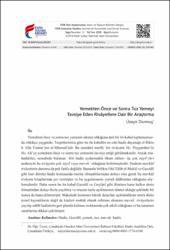Yemekten Önce ve Sonra Tuz Yemeyi Tavsiye Eden Rivâyetlere Dair Bir Araştırma
Citation
DURMUŞ, Üzeyir. "Yemekten Önce ve Sonra Tuz Yemeyi Tavsiye Eden Rivâyetlere Dair Bir Araştırma." FSM İlmî Araştırmalar İnsan ve Toplum Bilimleri Dergisi, 12 (2018): 379-403.Abstract
Yemekten önce ve sonra tuz yemenin sünnet olduğuna dair bir ön kabul toplumumuzda
oldukça yaygındır. Tespitlerimize göre bu ön kabulün en eski hadis dayanağı el-Hâris
b. Ebû Üsâme’nin el-Müsned’idir. Bu eserdeki merfûʿ bir rivâyette Hz. Peygamber’in
Hz. Ali’ye yemekten önce ve sonra tuz yemesini tavsiye ettiği görülmektedir. Ancak muhaddisler,
senedinde bulunan –biri hadis uydurmakla itham edilen– üç çok zayıf râvî
nedeniyle bu rivâyetin çok zayıf veya mevzûʿ olduğunu belirtmişlerdir. Hadisin mevkûf
rivâyetinin durumu da pek farklı değildir. Bununla birlikte Ebû Tâlib el-Mekkî ve Gazzâlî
gibi bazı âlimler hadis konusunda otorite olmadıklarından dolayı olsa gerek bu mevkûf
rivâyete kitaplarında yer vermişler ve bu uygulamanın yemek âdâbından olduğunu söylemişlerdir.
Daha sonra bu ön kabul Gazzâlî ve Geylânî gibi âlimlere karşı halkın derin
itimadından dolayı hızla yayılmış ve orucun tuzla açılmasının sünnet olduğu şeklinde bir
inanış da buna eklenmiştir. Makalede konunun teknik detayları açıklandıktan sonra dinin
temel kaynaklarını değil de kişileri mutlak olarak referans almanın mevzûʿ rivâyetlerin
yayılıp sahîh hadislerin geri planda kalması noktasında çok etkili olduğuna ve bu tutumun
zararlarına dikkat çekilmiştir. An acceptance that it is a Sunnah to eat salt before and after meal it is very common
in our community. According to our findings, the oldest hadith support of this acceptance
is al-Musnad of al-Harith b. Abū Usāma. It seems in the narration marfūʿ in this book that
The Holy Prophet advised Ali to eat salt before and after meals. However, the muhaddiths
stated that this narration is very daʿīf or fabricated, because of the three very daʿīf narratives
in its sanad that one of the three narratives who were accused with the fabricating
hadith. The conditions of the its narration mawqūf are not very different. However, some
scholars such as Abū Tālib al-Makkī and Ghazālī did not have authority over the hadith,
so they mentioned this narration mawqūf in the their books and said that this practice was
in the rules of eating. Later, this acceptance spread rapidly due to the deep reverence of
the people against the scholars like Ghazālī and Jīlānī and added to the belief that sunnah
is opening the fasting opening with salt. In article, after the technical details of the subject
have been explained, it has been noted that the absolute sources of reference of religion
not the basic sources of religion are very effective at spreading the fabricated hadiths and
keeping the sahīh hadiths on the background and the damage caused by this attitude has
been noted.



















